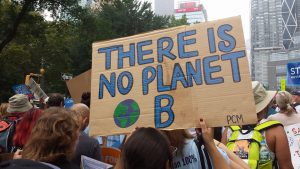By Arturo Castañares / Publisher and CEO 
Humans have an incredible ability to reason and learn, and building on that knowledge has led to the advancement of technology from building fires to computers to self-driving cars.
Over the course of human history, the development of scientific knowledge has been built upon radical ideas, tested by experiments, and challenged by rivals. Sometimes, we think we know how something works, then we discover a better way to test it and explain it as new technologies develop. That’s progress.
Our understanding of the universe, for example, has grown from thinking the Sun revolved around the Earth, to knowing it’s the other way around. No one now disputes the Earth is round, but only 500 years ago that, too, was an untested theory.
Discovery of new information has always pushed humans beyond the horizon, whether physical or theoretical. Our experiments in medicine have resulted in life-saving vaccines, operations, and treatments that, just a few generations earlier, were unimaginable.
We have artificial hearts, organ transplants, and even in vitro surgeries to treat unborn babies. We can cure diseases and give parents children they could not have on their own. Procedures that are common today were only theories just a few years ago.
But, when it comes to the environment, though, the science of man’s impact on climate change has become a political fight that has clouded the scientific proof of how we are negatively impacting our planet in irreparable ways.
For over 30 years, the discussion on the effects of global warming and the root causes of it has become a Republican versus Democrat fight that now affects how our government makes policies to deal with everything from cars to factories to national parks.
Over the past eight years, Barack Obama pushed for the United States to be the world leader in addressing the impacts of climate change. His New Energy Plan called for reducing our reliance on coal burning power plants and encourages the development of solar, wind, and other clean technologies to reduce emissions.
The U.S. has not been alone in those efforts. The Paris Agreement reached in 2016 was the result of several years of work among representatives from 195 countries. Scientists, politicians, and industry representatives met for years to reach the accord aimed at reducing carbon emissions in the atmosphere. From Angola to Zimbabwe, even Iran, nearly every country in the world agreed to do their part to reduce global warming.
President Donald Trump, and most Republicans, however, disagree. This week, Trump Administration officials are meeting to discuss withdrawing the U.S. as a signatory to the Paris Agreement. And Trump has already signed an executive order to repeal Obama’s New Energy Plan.
Now, the U.S. Environmental Protection Agency, the EPA, has a new directive from President Trump. The new EPA Director, a self-proclaimed climate change skeptic, has announced that the EPA will review the science behind decades-old policies that have protected the environment from man-made pollutants that are known to contribute to global warming.
Ironically, the very agency charged with protecting the environment (it’s even in its name) has now become an obstacle in combating climate change.
The main argument used by so-called climate change deniers is that the science is not definitive in concluding that manmade pollutants are a significant contributing factor to climate change. They cite that the Earth’s climate has warmed in past centuries before machines and cars existed, even arguing that dinosaurs caused more damage to the environment than humans do. They also call climate change a theory because it’s not yet proven beyond a shadow of a doubt.
Worse, critics claim climate change is a conspiracy created by liberal Democrats to control our behavior and hurt businesses. This has created a political divide that now pits most Democrats against most Republicans based solely on politics, not science.
So, when did science take on a partisan slant? Breathing clean are is not liberal. Increasing global temperatures doesn’t only affect Democrats. And melting ice caps and rising sea levels will surely devastate home in Republicans-leaning area just like in more Democrat ones.
No, science is not partisan. 97 percent of scientists (Democrats, Republicans, and non-partisans) agree that human activities, including millions of cars and trucks, factories, and animals raised to feed the 7.5 billion people on Earth, all generate high levels of carbon dioxide, the largest contributor to global warming.
Sure, the planet has gone through natural warming and cooling periods throughout its history, but never before have humans been a huge factor by adding billions of tons of carbon to the mix each year.
There is no doubt that science can conclude with very high certainty that carbon dioxide causes a greenhouse effect that warms our environment. And no one can deny that we are creating billions of tons of carbon emissions each year. Is it really too big a leap of logic to deduce that we are adversely impacting the environment?
There are valid policy debates to be had on how to implement carbon emission reductions, how to pay for it, and who should be part of it. At its core, it’s the age-old struggle between business interests and consumers.
But, until we can get past the skepticism of whether it exists, we only delay the work to tackle global warming in any meaningful and equitable way.
Let’s stop wasting time on political fights that delay serious action on climate change. As we fight, we could be nearing an irreversible tipping point that will cause serious damage to our quality of life, or even bring about the end of it.
That’s not partisan; that’s foolish.
Science should be left in the hands of scientists, not politicians.